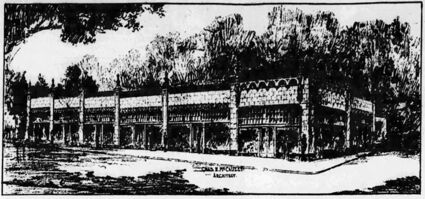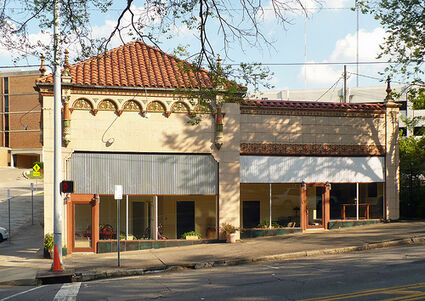Venetian Village building: Difference between revisions
No edit summary |
|||
| (10 intermediate revisions by the same user not shown) | |||
| Line 1: | Line 1: | ||
[[Image:Pita Stop building.jpg|right|thumb| | [[File:Venetian Village rendering.jpg|right|thumb|425px|Architect's rendering]] | ||
The ''' | [[Image:Pita Stop building.jpg|right|thumb|425px|The 11th Avenue South side of the Pita Stop building in June 2009]] | ||
The '''Venetian Village building''' (originally the '''11th Ave. & 12th St. S. Stores''', also called the '''Pita Stop building''' or '''Highlands Village''') is a small retail strip located on the southwest corner of [[11th Avenue South]] and [[12th Street South|12th Street]] in [[Southside]]. Its current familiar name refers to the [[Pita Stop Cafe]], a Mediterranean restaurant which opened in [[1977]] and has expanded to occupy most of the building. | |||
It was constructed in [[1928]]–[[1929]] by [[Sloss Real Estate|Shepherd & Sloss]] as a speculative business center, and celebrated a grand opening on [[March 28]]. The design by [[Charles McCauley]], featured elaborate polychrome terra-cotta ornamentation and is considered a fine example of the Renaissance Revival style. Brick for the building was furnished by the [[Stephenson Brick Co.]] and the floors were installed by the [[American & Venetian Marble Co.]] | |||
By [[2000]] the building was owned by [[HealthSouth]] and the vacant corner space was used to store old computer equipment. That year [[Fairfield]] mayor [[Larry Langford]] asked HealthSouth CEO [[Richard Scrushy]] to make some of that space available to [[John Katopodis]] for his [[Council of Cooperating Governments]]. He later proposed that the unused computers be refurbished and given to schools. Katopodis helped create the [[Computer Help For Kids]] non-profit which shared office space with the Council. Another charity, the [[Holy Family Foundation]], headed by [[Melva Langford]], also used the building for its business address. | |||
After Scrushy's dismissal from HealthSouth under the cloud of a massive accounting scandal the company sold off its Southside holdings to [[UAB]] for $33 million, which included an option to buy the | After Scrushy's dismissal from HealthSouth under the cloud of a massive accounting scandal the company sold off its Southside holdings to [[UAB]] for $33 million, which included an option to buy the Venetian Village building. Katopodis sued HealthSouth saying that he had been promised the building as partial payment for consulting work. The company filed a countersuit alleging mismanagement of contributions and the two parties reached an undisclosed agreement in March [[2008]], shortly after testimony began. Though barred from discussing specifics regarding the settlement, Katopodis indicated that the charities then sharing office space in the building would continue to have access to the space for the immediate future. | ||
With the dispute over the title to the building concluded, UAB's offer of $450,000 was accepted. The university | With the dispute over the title to the building concluded, UAB's offer of $450,000 was accepted. The university leases space to the Pita Stop restaurant. | ||
==Tenants== | |||
The original tenants included an [[A & P]] grocery store, [[South Highlands Pharmacy]], [[Electric Maid Bakery]], [[Noble Cleaners & Dyers]], [[South Highland Beauty Shop]] and [[South Highland Barber Shop]]. | |||
In the late 1960s, the building was occupied by a barber shop, a flower shop, a pool hall and a deli. | |||
* 12th Street South | |||
** 1100–1102: [[Subway]] (2021–), former location of [[Bangkok House]] Thai restaurant (1990s), [[Computer Help for Kids]] (2000-2008) | |||
** 1104–1108: [[Pita Stop Cafe]] (1977–) | |||
*** 1108: former location of [[Black Doggs]] smoke shop (1978) | |||
* 11th Avenue South | |||
** 1169: [[University Coin Laundry & Dry Cleaners]] (2000–) | |||
==References== | ==References== | ||
* Birmingham Historical Society (1981) ''Southside-Highlands Report: Architectural and Historical Resources. Preservation Recommendations. Birmingham: City of Birmingham and Alabama Historical Commission. | * Birmingham Historical Society (1981) ''Southside-Highlands Report: Architectural and Historical Resources. Preservation Recommendations. Birmingham: City of Birmingham and Alabama Historical Commission. | ||
* Whitmire, Kyle (February 19, 2008) "Langford consultant has tricky ties; and an office at the Pita Stop building." ''Birmingham Weekly'' | * Whitmire, Kyle (February 19, 2008) "Langford consultant has tricky ties; and an office at the Pita Stop building." ''Birmingham Weekly'' | ||
* Wolfson, Hannah (June 27, 2008) "UAB buys Pita Stop building." | * Wolfson, Hannah (June 27, 2008) "UAB buys Pita Stop building." {{BN}} | ||
* DeButts, Jimmy (June 27, 2008) "UAB completes city property deal with HealthSouth." | * DeButts, Jimmy (June 27, 2008) "UAB completes city property deal with HealthSouth." {{BBJ}} | ||
* Carlton, Bob (September 1, 2021) "The Alabama restaurant that’s a window to another world." {{BN}} | |||
[[Category: | [[Category:1929 buildings]] | ||
[[Category:Charles McCauley buildings]] | |||
[[Category:11th Avenue South]] | [[Category:11th Avenue South]] | ||
[[Category:12th Street South]] | [[Category:12th Street South]] | ||
[[Category:UAB buildings]] | [[Category:UAB buildings]] | ||
Latest revision as of 10:18, 21 June 2023
The Venetian Village building (originally the 11th Ave. & 12th St. S. Stores, also called the Pita Stop building or Highlands Village) is a small retail strip located on the southwest corner of 11th Avenue South and 12th Street in Southside. Its current familiar name refers to the Pita Stop Cafe, a Mediterranean restaurant which opened in 1977 and has expanded to occupy most of the building.
It was constructed in 1928–1929 by Shepherd & Sloss as a speculative business center, and celebrated a grand opening on March 28. The design by Charles McCauley, featured elaborate polychrome terra-cotta ornamentation and is considered a fine example of the Renaissance Revival style. Brick for the building was furnished by the Stephenson Brick Co. and the floors were installed by the American & Venetian Marble Co.
By 2000 the building was owned by HealthSouth and the vacant corner space was used to store old computer equipment. That year Fairfield mayor Larry Langford asked HealthSouth CEO Richard Scrushy to make some of that space available to John Katopodis for his Council of Cooperating Governments. He later proposed that the unused computers be refurbished and given to schools. Katopodis helped create the Computer Help For Kids non-profit which shared office space with the Council. Another charity, the Holy Family Foundation, headed by Melva Langford, also used the building for its business address.
After Scrushy's dismissal from HealthSouth under the cloud of a massive accounting scandal the company sold off its Southside holdings to UAB for $33 million, which included an option to buy the Venetian Village building. Katopodis sued HealthSouth saying that he had been promised the building as partial payment for consulting work. The company filed a countersuit alleging mismanagement of contributions and the two parties reached an undisclosed agreement in March 2008, shortly after testimony began. Though barred from discussing specifics regarding the settlement, Katopodis indicated that the charities then sharing office space in the building would continue to have access to the space for the immediate future.
With the dispute over the title to the building concluded, UAB's offer of $450,000 was accepted. The university leases space to the Pita Stop restaurant.
Tenants
The original tenants included an A & P grocery store, South Highlands Pharmacy, Electric Maid Bakery, Noble Cleaners & Dyers, South Highland Beauty Shop and South Highland Barber Shop.
In the late 1960s, the building was occupied by a barber shop, a flower shop, a pool hall and a deli.
- 12th Street South
- 1100–1102: Subway (2021–), former location of Bangkok House Thai restaurant (1990s), Computer Help for Kids (2000-2008)
- 1104–1108: Pita Stop Cafe (1977–)
- 1108: former location of Black Doggs smoke shop (1978)
- 11th Avenue South
- 1169: University Coin Laundry & Dry Cleaners (2000–)
References
- Birmingham Historical Society (1981) Southside-Highlands Report: Architectural and Historical Resources. Preservation Recommendations. Birmingham: City of Birmingham and Alabama Historical Commission.
- Whitmire, Kyle (February 19, 2008) "Langford consultant has tricky ties; and an office at the Pita Stop building." Birmingham Weekly
- Wolfson, Hannah (June 27, 2008) "UAB buys Pita Stop building." The Birmingham News
- DeButts, Jimmy (June 27, 2008) "UAB completes city property deal with HealthSouth." Birmingham Business Journal
- Carlton, Bob (September 1, 2021) "The Alabama restaurant that’s a window to another world." The Birmingham News

